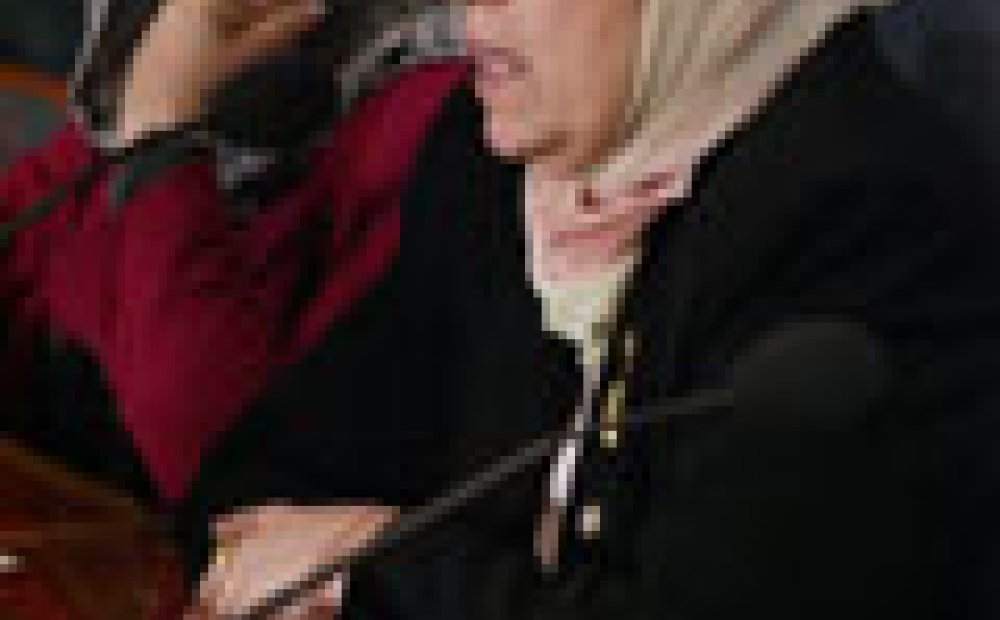Leaders from Iraq Discuss What Comes Next

Security. Assistance. Timing. All three are crucial in determining the path Iraq takes in the upcoming months, said a group of Iraqi representatives during a March 12 meeting co-sponsored by the Conflict Prevention Project and Middle East Program of the Woodrow Wilson International Center for Scholars, and Women Waging Peace.
In the United States to participate in the Commission on the Status of Women conference at the United Nations and to consult with senior officials in Washington, DC, the delegation included Rajaa Habib Khuzai, member of the Iraqi Governing Council; Wisal Said and Eman Alwan, Counselor and Second Secretary, Ministry of Foreign Affairs respectively, Amal Ma'malchi, nominee for Deputy Minister of Higher Education, Zainab Al-Suwaij, co-founder of the Iraqi Women's Higher Council and several other leaders from non-governmental organizations and the private sector.
Since the invasion of Iraq nearly one year ago, immense progress has been made toward creating a more peaceful and democratic Iraq. Yet as Iraq moves toward sovereignty and the transition of power, much difficult work remains. Opposition to the interim constitution, chronic insecurity, and the uncertainty of whom will assume power on July 1st may impede the process toward democratic governance in Iraq. Many Iraqis are laboring tirelessly for sustained peace—one including an inclusive and representative government, energized economy and engaged civil society.
Nowhere is the commitment toward a more stable and peaceful Iraq better exemplified than by a group of women leaders facing an uphill battle for political representation. Despite great obstacles both in terms of personal security risks and logistical hurdles, these women remain committed to the cause of ensuring women's voices are heard in the new Iraq.
Vocal and eloquent in their opinions, three themes emerged:
· without security, progress is impossible in Iraq;
· Iraqi women, who are highly educated and skilled in professional fields, have been less involved in politics and need specific training to mobilize and put forth qualified women candidates in the upcoming elections. And while most Iraqis are committed to the notion of democracy, few understand its applications, like how to comprise and build consensus, participants said. Free speech, respect for different religious and ethnicities and promoting tolerance and support for women's rights must not be considered American or Western impositions, but could be the basis for a better Iraq, they suggested. More education on these concepts is a key to ensuring better understanding and incorporation.
· the next three and half months are crucial in determining Iraq's future.
While the Coalition Provisional Authority intends to hand over power to Iraqis on June 30, there are some hard questions that need to be asked about this approach. While Washington is eager to transfer responsibilities to Iraqis and the United Nations and further empower the work of non-governmental organizations and contractors in reconstruction and institution building, little progress will be made if the security situation remains so poor that simply driving around can prove a fatal undertaking. During the meeting, we paused to remember our friends and colleagues, Fern Holland and Salwa Oumashi, who were slain last week in a town south of Baghdad. Although law and order are being established, pockets of violence and horrific incidents undermine progress and impede the good intentions of those working in Iraq.
Advocacy efforts by women's groups were instrumental in achieving political representation, Dr. Rajaa Khuzai said. While they had lobbied for a mandated 40 percent quota of seats for women in the legislature, they were successful in convincing the Iraqi Governing Council to write in the new Iraqi interim constitution that a minimum of 25 percent of places should go to women. Furthermore, the draft includes an explicit provision that Iraqis are equal in their rights regardless of gender. However, she noted that it's not clear how the 25 percent will be mandated and whether the provision will remain after power is transferred to an undetermined entity.
"The concern now is how to fill the seats with eligible and capable women who have the ability to fill the chair, said Zainab Al-Suwaij We need training and the upcoming year is critical and will lay the foundation for the upcoming year. Women's participation in politics is new which is compounded by the fact that most women are not involved in political parties. The decks are stacked against independent candidates, other speakers said.
Ambiguities within the interim document, including wording suggesting that 25 percent was a target, rather than a quota and questions regarding the role of Islamic, or Sharia law, represented potential flashpoints, they said.
While pledges for Iraq assistance number near $20 billion, the challenge is channeling that assistance quickly and correctly, speakers said. Recently, in commemoration of International Women's Day, Secretary of State Colin Powell, announced a 10 million dollar initiative to boost women's rights in Iraq. While this is commendable, the future of Iraq will be determined in the next months and getting it right in Iraq means funding organizations who working both in the cities and outer regions. They fear that like Afghanistan, assistance may only reach the most secure and accessible areas.
The fight is just beginning. Rebuilding political and economic systems and enabling conditions for security, well-being, and justice require expensive and long-lasting commitments. Laws on the books might not translate into practice on the ground, they opined. Better security, training and constant engagement are ways that Iraq gets a chance to succeed when they become a sovereign country again.
Anita Sharma
Director
Conflict Prevention Project
202-691-4083
Hosted By

Middle East Program
The Wilson Center’s Middle East Program serves as a crucial resource for the policymaking community and beyond, providing analyses and research that helps inform US foreign policymaking, stimulates public debate, and expands knowledge about issues in the wider Middle East and North Africa (MENA) region. Read more
